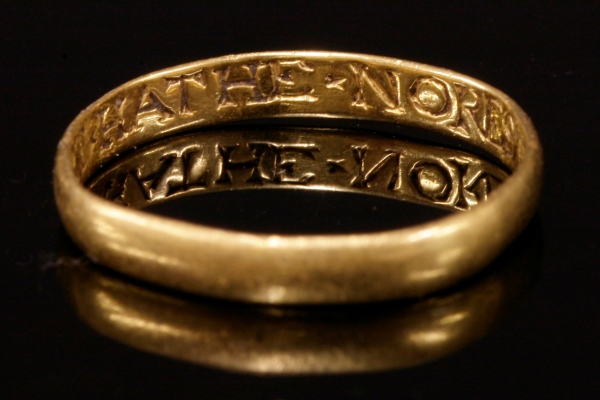A Rare Token Of Affection
In both England and France, posy rings - a ring with a short inscription expressing regard, friendship and most frequently love - were the most popular form of ring from the late medieval period to the 18th century.
Samuel Pepys mentions them in his diary and Shakespeare refers to them in Hamlet and The Merchant of Venice. In both England and France, posy rings - a ring with a short inscription expressing regard, friendship and most frequently love - were the most popular form of ring from the late medieval period to the 18th century.
Taking their name from the old French word ‘poesy’ or 'posie' meaning short rhyme or poem, they reached their peak of popularity in the 16th and 17th centuries when they were typically inscribed inside the band. The wearing of words against the skin was believed to increase their poignancy.

Countless inscriptions have been recorded conveying messages such as ‘True love will not remove, When this you se remember me or You and I will Lovers dye'. The ‘posy’ to the ring that is to be auctioned at our November 21 Jewellery, Watches and Silver sale is unusual - possibly unrecorded. Further details will be released in our auction catalogue. The ring was dug up by the vendor in the garden of their local property. It is believed the land was formerly an orchard once owned by the Countess of Warwick. The estimate for this souvenir of a now forgotten romance is £300-500.
Jewellery, Watches and Silver - Tuesday 21 November, 10am
For more information, please contact:
Catriona Smith | catrionasmith@sworder.co.uk
Recent News
Sworders Returns to Snape!
Building on the success of the first event held in partnership with Britten Pears Arts in autumn 2025, Sworders’ team of specialists will return to Snape Maltings on Wednesday 11 February for the next in its series of Art & Antiques Valuation Days.
19 January 2025
Paving the Way | Design-led Furniture Brands
Our upcoming Design auction offers carefully crafted pieces by designers and brands that have collaborated to create distinctive, high‑quality furniture, such as Heal's and Fritz Hansen.
15 January 2026
Sworders Supports | The HALO Trust
We are proud to announce that The HALO Trust has been selected as our Charity of the Year for 2026, and throughout the year, we’ll be supporting HALO’s lifesaving work through fundraising and education, whilst championing their mission.
14 January 2025